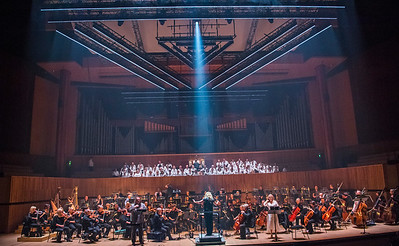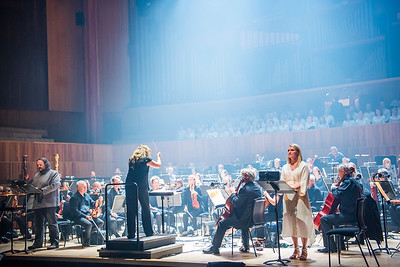Royal Festival Hall, 1 July 2017
In recent years we have encountered many stagings of oratorio – the Bach Passions, Handel’s Messiah, Verdi’s Requiem – but this was the first time I can recall a presentation of Elgar’s The Dream of Gerontius. I say presentation advisedly as this was not a staged event so much as an ambient creation to heighten our involvement and understanding. In this it was remarkably successful. Rather than trying to create an alternative narrative or simply aping the text, Lucy Carter gave us a (literally) moving light scape which reflected the moods and places of the text without ever becoming too literal.
The photo describes the setting far more easily than I can, with the lines of strips of pin-point lights positioned high above us in sets of triangles. If this was a Trinitarian reflection it was very successful!
Together with a slight haze of smoke theses created an every shifting environment which moved us effortlessly from the solid realities of the earth to the heavenly realm without ever forcing the mind to accept the unacceptable. If the changes sometime seemed too fast, look, next time you are in a cathedral, at the speed with which the light coming through the top windows changes the internal ambience of the building – it is remarkably rapid!
It reminded me of the directions Wagner gives for the transitions in Parsifal, where one scene simply becomes another without any apparent change taking place. I’d love to see Lucy Carter working on Wagner!
ENO understandably brought us operatic voices which were entirely appropriate for Simone Young’s approach to the score. Gwyn Hughes Jones is a muscular, and very obviously Welsh, Gerontius, who gave us many insightful moments. With a strong will I sever was just that, and there was a real heroism about In thine own agony. Most telling was the radiant joy of Take me away – no pain here but exultation in salvation realised. A wonderful moment.
Patricia Bardon gave us a genuinely contralto Angel with the rich fullness Elgar certainly intended and a warmth for the Angel’s farewell which has become ever rarer today. Matthew Rose was in exemplary voice as the Priest and Angel of the Agony. After his King Marke it would be good to hear him in Parsifal soon.
The combined choruses of ENO and the BBC singers made a strong impact if limited in numbers. Elgar is writing for much larger choral forces and there were times when one could have wished for a larger body of sound, particularly in Praise to the Holiest. However the clarity of the text for most of the evening impressed.
The orchestra was dramatically alive throughout and Simon Young brought an emotional intensity to her reading of the score which some traditional forces lack or turn into sentimentality.
ENO is evolving in its approach to its repertoire. This was a most promising development which we hope will continue.


